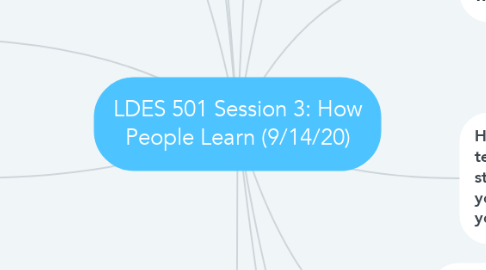LDES 501 Session 3: How People Learn (9/14/20)
by Yianna Vovides

1. Why does a post-secondary school (e.g., high school) expect students to master learning strategies when they get into higher education?
1.1. Why are not learning strategies not taught in all levels of education (K-12)? (McGuire, 2015, p. 3)
1.2. Is Bloom’s Taxonomy the reason many students’ study habits consist of rereading?
2. As learning designers, how can we motivate students to focus on their learning strategies rather than objectives? (McGuire, 2015, p. 27)
2.1. How can we motivate students to focus on their learning goals rather than GPA goals? (McGuire, 2015, p. 37)
3. how can teachers best communicate to students that learning should be prioritized outside of school?
4. How do we advance new methods of learning without integrating Love’s assertions?
5. As we prepare our learning engagement projects, how do we respond to our learning engagement problem in a holistic fashion? How do we recognize our own blind spots?
6. how can institutions help faculty focus on learning, particularly when there may not be much accountability or incentive for faculty to improve (e.g. due to the tenure system, etc.)?
6.1. what is the role of non-faculty in students' experiences?
6.2. How might we help design environments that improve student motivation in a way that facilitates learning?
7. What are tectonic shifts? How might tectonic shifts look in the digital world and the non-digital world? (Siemens, 2004)
8. How can a learning designer, teacher, or mentor, teach a student how to learn when are you learning the material yourself? (McGuire, 2015, p. 2)
9. How should instructional designers use education research when they are developing their courses, considering there is so much disagreement on what works and may even go against our intution?
10. What is right about our education system? Are there any practices, methods, theories that are widespread, long-standing and successful?
11. What parts of McQuire’s discussion in the first 8 chapters compliment Love’s framework?
11.1. Do these types of improved teaching/learning strategies uphold aspects of the education survival complex, directly combat it, or seem distanced from it? Where else did you see places of tension?
12. what learning strategies would one use to be an expert in parsing through large amounts of data in order to learn about a topic?
12.1. Does being an expert include being adept with such technology that can parse through lots of data? (This reminds me of Interface University from Alternative Universities, in which humans work in concert with technology to solve a problem.)
13. What does it mean to have a growth/fixed mindset in under connectivism?


